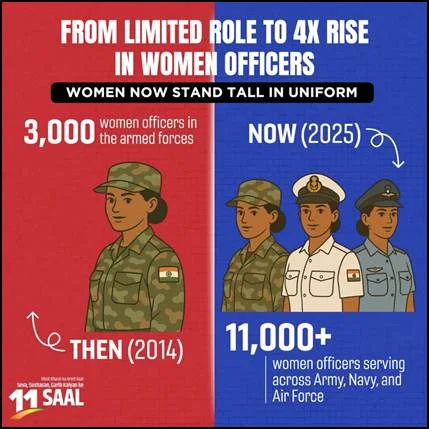SC Strikes Down Army’s Gender-Based Quota for JAG Recruitment | 14 Aug 2025
Why in News?
The Supreme Court (SC) of India struck down the Indian Army’s policy limiting the appointment of women officers to the Judge Advocate General (JAG) branch, rejected the argument that women cannot serve in counter-insurgency or counter-terror forces, and emphasized gender equality in all combat-support arms.
Note: The JAG is the legal arm of the Indian Army, advising on military law under the Army Act, 1950, and guiding commanders on operational, administrative, and disciplinary matters.
- JAG officers are commissioned combatants who can be deployed in combat-support roles during wartime.
- Under Section 12 of the Army Act, 1950, women are eligible to join JAG.
What are the SC’s Directives on Army JAG Recruitment and Women in Operational Roles?
- Common Merit List: The SC struck down the Army’s policy reserving six of nine JAG vacancies for men, ruling that the Army and the Union Government cannot limit the number of women officers in the JAG once they are permitted entry under the Army Act, 1950 and directed them to prepare a single merit-based list, ensuring selection solely on merit.
- Equal Opportunity in Combat-support Roles: The SC held that excluding women from counterinsurgency or counter-terror roles lacks legal basis, violates equality, and stressed that no nation is secure when half its population is held back.
- Proven Operational Capability: SC highlighted that unlike the Army, other forces have no bar on women in combat roles, citing Captain Ojaswita Shree, Major Dwipannita Kalita, and Flight Lieutenant Shivangi Singh as examples of women excelling in high-risk duties.
- SC noted Major Gopika Bhatti’s convoy command in militant-prone areas and Colonel Anshu Jamwal’s UN Peacekeeping missions in combat zones, questioning the exclusion of such capable officers from deployment in counter-insurgency or counter-terror operations
SC Rulings on Women in the Defence Forces
- Secretary, Ministry of Defence vs. Babita Puniya (2020): SC mandated Permanent Commission (PC) for women in the Army in all arms where Short Service Commission (SSC) is available.
- SC held that women should be allowed to hold command positions and declared the denial of PC based on gender as a violation of Article 14 of the Constitution.
- Kush Kalra vs. Union of India (2021): SC ordered the entry of women into the National Defence Academy (NDA), allowing them to train for permanent commissions alongside men.
Nari Shakti in Defence
- Over the past decade, women in India’s defence forces have grown from around 3,000 (2014) to over 11,000 (2025), reflecting a major policy and mindset shift.
- The NDA inducted its first 17 female cadets in 2022, and since then 126 women have joined across four batches, marking a historic step in integrating women across combat support and operational roles.
What is the Significance of Women in Defence Forces?
- Enhancing Operational Effectiveness: Women enhance modern military operations by contributing diverse skills in, intelligence, logistics, and humanitarian missions, improving situational awareness and decision-making in conflict zones.
- Strengthening Peace and Security: Women in defence play a crucial role in protecting vulnerable populations, especially women and children, during conflicts.
- Gender-diverse forces are more responsive to societal needs, ensuring security strategies are holistic and effective.
- Social Impact: Women in senior roles inspire and mentor younger officers, boosting career growth and morale.
- During Operation Sindoor, Col. Sofia Qureshi and Wg Cdr. Vyomika Singh exemplified leadership and professionalism, leaving a significant social impact.
- Integrating women in defence reflects societal progress, ensures representation, upholds Articles 14, 15 and 16, and promotes equality, accountability, and human rights in the armed forces.
| Read more: Challenges and Way Forward for Women in Indian Armed Forces |
Keywords for Mains
- “Diversity Strengthens Strategy” : Gender inclusion improves operational effectiveness.
- “Peace Through Inclusion”: Women’s role in humanitarian, peacekeeping, and civic operations.
- “Combat-Ready Equality”: Women eligible for all combat-support roles.
- “Merit Over Gender”: Selection in armed forces based on capability, not sex.
|
Drishti Mains Question: Evaluate the role of judicial intervention in ensuring gender parity in national security institutions. |
UPSC Civil Services Examination Previous Year Question (PYQ)
Mains
Q. What are the continued challenges for Women in India against time and space? (2019)


.webp)